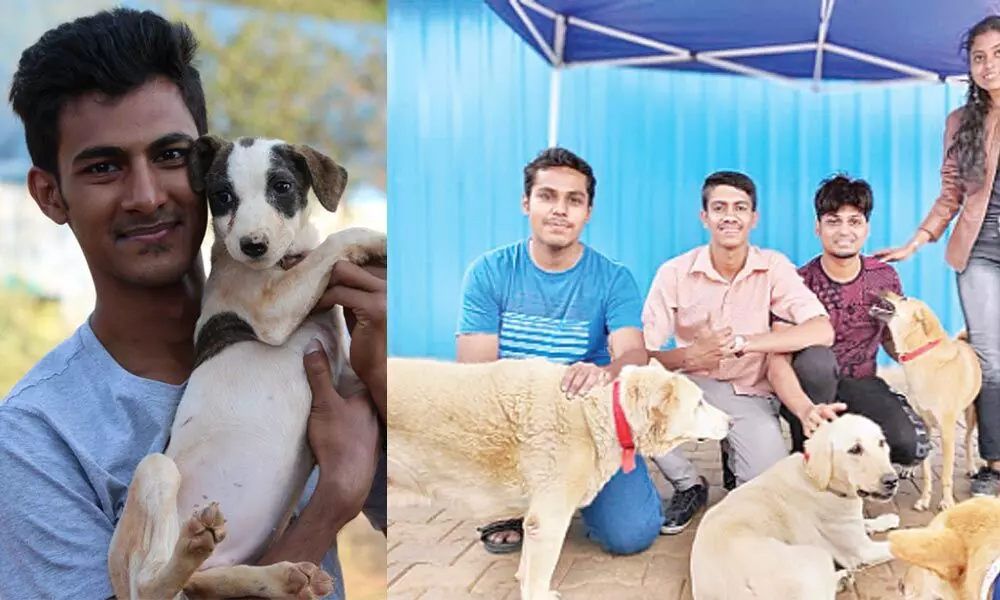A sensitive approach to canine care

A sensitive approach to canine care
Meet Haris Ali, animal rescuer and entrepreneur, started Sarvoham Welfare Trust to rescue and rehabilitate injured dogs from across the city
Meet Haris Ali, animal rescuer and entrepreneur, started Sarvoham Welfare Trust to rescue and rehabilitate injured dogs from across the city. With his daily pocket money of Rs 2, Haris would buy a small pack of biscuits and feed this canine family. However, the boy witnessed a tragic incident, where one of the puppies was beaten to death by his neighbour. "The horrible event shook me hard, but as the years passed by, I began to forget about that incident," says Haris
"On December 31, 2016, many years after that incident, I came across a dog that was foaming at the mouth, looking very ill. Despite the many calls to NGOs and hospitals, nobody turned up. After waiting for about an hour, I built up the courage to take him to the hospital myself," he says.
He continues, the veterinarian revealed to him that the dog was suffering from canine distemper, which is contagious among the species. At that point, while he was concerned about where to take the dog for treatment and shelter, to his luck, two women stepped forward to take care of the dog and provided medication.
Haris Ali and some of his closest companions That night's effort of reaching out to people culminated in Haris getting added to a WhatsApp group, where people would share information about injured or ill dogs that needed help. He took it upon himself to rescue these dogs as and when the requests came. He would either admit them to the hospital or take them to the animal shelter CUPA (Compassion Unlimited Plus Action) in Bengaluru city. "This was a real challenge for me as my entire day would be spent in travelling from south Bengaluru to north Bengaluru, through the city's infamous traffic. I realised that this was not feasible, and things needed to be more timely when it came to such rescues," he says.
Hence, in 2017, he started a shelter in a small room, and he saw about 20 dogs coming in on the first day itself. Once he got used to carrying out rescue operations successfully, he shifted the shelter to a bigger plot in J.P. Nagar to accommodate the rising number of dogs. Thus, Sarvoham Welfare Trust was born. Sarvoham – to rescue, shelter, protect, re-home On a plot of about 12,000 sqft, Haris runs the Sarvoham shelter, which has about 25 kennels and a clinic that also performs surgeries and treatments. The trust also has a small staff quarter for the members to reside, a storage room, two administrative offices, and a puppy ward to house any surviving puppies
It also runs two ambulances to rescue dogs from across the city. The trust also has a big open space for the dogs to play around, who have been part of this shelter for a long time. At present, the shelter houses about 170 dogs. Every time Sarvoham rescues a dog, it ensures that they are neutered and spayed on time, given that they are healthy enough for the surgery.
According to Haris, one of the biggest challenges is the insensitivity of people towards these animals, who often face the brunt of their actions. What makes matters worse is people report such cases late, or completely ignore such ailing dogs. "Another problem is, there is a group of animal haters who don't want anything to do with stray animals. They often pick fights and create problems for us," Haris shares. Besides, the lack of animal care from the government's end poses a big problem. Dogs are not timely vaccinated and sterilised, which puts the rescuers at risk. Moreover, whenever there is a case of animal cruelty, the fines are menial, making it easier for offenders to escape accountability.
The coronavirus pandemic also gave its fair share of problems. Before the pandemic struck, Sarvoham had about nine staff members and about 20 volunteers. But with the lockdown, Haris was down to just three staffers, which resulted in minimum rescue operations. From rescuing four to five dogs a day, Sarvohan was rescuing about 20 in a month. This was also because Haris didn't want anybody to be at risk.
However, Haris has not lost hope. Talking about the way forward, he says, "In the next five years, we would expand our services for the welfare of other stray animals, including cows, buffaloes, and other cattle. "We also hope to end cruelty, and conduct more awareness campaigns around the laws that exist for animals," he concludes.














